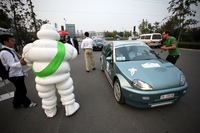Daimler Scores Overall Victory in 2007 Michelin Challenge Bibendum in Shanghai
STUTTGART, Germany, Nov. 20 -- With a total of 23 distinctions, Daimler AG emerged as the most successful participant from this year's Michelin Challenge Bibendum in Shanghai. Seven cars from the Mercedes- Benz and smart brands faced up to the competition in the different disciplines of the globally most important event in the field of sustainable mobility. Some 80 participating cars were put to the test in the categories of acceleration, maneuverability, noise pollution, local pollutants, fuel efficiency and CO2 emissions (tank-to-tire). In addition, the Mercedes-Benz E 300 BLUETEC, which made its European debut only recently, finished in first place in the 170-kilometer rally for production cars. Distinctions for the best design went to the smart fortwo cdi in the production car category as well as to the Mercedes-Benz F 600 in the prototype car category.
The distinctions at a glance
-- Mercedes-Benz E 300 BLUETEC
Four distinctions overall (categories: acceleration, maneuverability
and local pollutants, as well as winner in the production car rally)
-- Mercedes-Benz E 200 NGT
Four distinctions overall (categories: acceleration, local pollutants,
fuel efficiency and CO2 emissions)
-- Mercedes-Benz A-Class F-Cell
Three distinctions each for the two participating cars (categories:
local pollutants, fuel efficiency and CO2 emissions)
-- Mercedes-Benz F 600
Three distinctions overall (categories: local pollutants and CO2
emissions, as well as Design Award in the prototype car category)
-- smart fortwo mhd (micro hybrid drive)
Two distinctions overall (categories: noise pollution and local
pollutants)
-- smart fortwo cdi, operating on synthetic BTL (SunDiesel biofuel)
Four distinctions overall (categories: noise pollution, fuel efficiency
and CO2 emissions, as well as Design Award in the production car
category)
This year, the Challenge Bibendum was staged in Shanghai from November 14 until 17. It is the world's most important forum for sustainable mobility. Its more than 3,000 participants include motor manufacturers, suppliers, energy companies, private and institutional research and development operations as well as some 450 international journalists. During this event, over 80 vehicles incorporating the latest technologies are tested under everyday operating conditions and evaluated in a large number of different categories.
Modular powertrain strategy for future mobility
The Daimler fleet at the ninth Michelin Challenge Bibendum reflected the company's powertrain strategy which is systematically geared to mastering the challenges which will arise in future private transport: ever more restricted access to cities, more stringent emission limits and ever scarcer resources versus the growing demand for individual mobility. This calls for a variety of drive concepts which are tailored to the individual applications.
The internal combustion engine will remain the Number One automotive drive system in the years to come - which is why Daimler is systematically working on its continuous improvement. The efficient and clean diesel engine, for instance, is particularly suitable for long-distance motoring. With the DIESOTTO, Mercedes-Benz demonstrates how the gasoline engine can be made even more economical in the future. When required, both diesel and gasoline engine can be combined with a hybrid module which additionally reduces fuel consumption and thus emissions in city traffic.
Alternative drive systems such as fuel cell or battery will complement the portfolio for specific applications - matched to the customer's requirements. Zero-emission vehicles powered by fuel cells or batteries are, for instance, a viable proposition for motoring in conurbations. On long distances, the fuel cell can in addition bring its advantages in terms of range to bear. Over and beyond this, Daimler promotes the development of high-grade and alternative fuels such as BTL (biomass-to-liquid), a second-generation biofuel.



